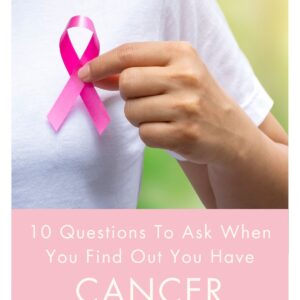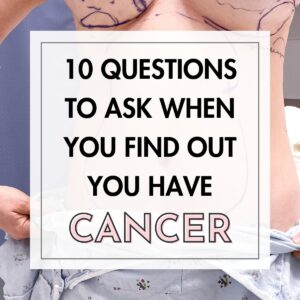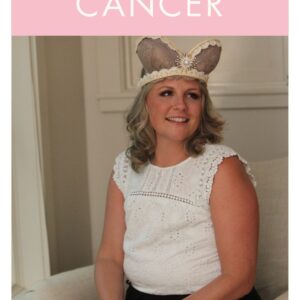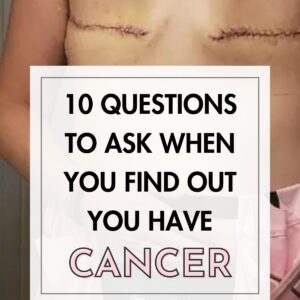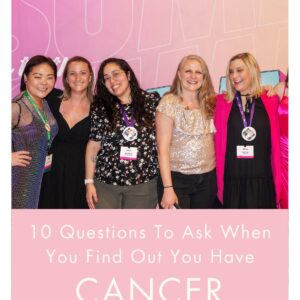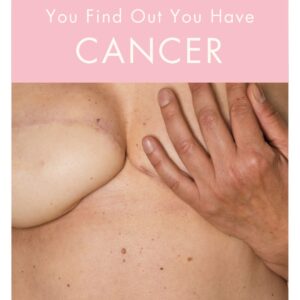When you receive a cancer diagnosis, it can be shocking and you may feel overwhelmed. Your appointments may feel like a blur as you process the storm of information you receive, trying to understand where your cancer is located, the type of cancer you have, and your treatment options. Knowing what questions to ask can lead to better outcomes and more empowerment. Today's post was written by the amazing Erin Perkins, who shared her top 10 questions to ask your doctor when you have cancer.
10 Questions To Ask When You Find Out You Have Cancer
In November 2020, suddenly, and before feeling a lump in my right breast, at 34 years old and while nursing my two-year-old, I knew I needed to call my healthcare team to schedule an annual exam. Still, I canceled the appointment as it neared because of COVID-19 and because my new primary care doctor said the annual did not include a breast exam. My gut was telling me to get a breast exam.
Weeks later, I noticed a lump and realized it was protruding and visible to me in the mirror. I worried and simultaneously brushed it off, believing, of my own volition, that I was too young to be diagnosed with cancer. My gut kept telling me to make an appointment, so I finally listened and saw my primary care doctor on January 12, 2021, hoping she would say it was nothing to be concerned about.
Instead, she ordered an ultrasound and a mammogram a few days later. I felt overwhelmed, but I still didn’t believe it could be cancer. At the mammogram/ultrasound appointment, the radiology technicians were stoic and hasty to get me in for a biopsy. I still thought it would come back benign. The biopsy happened the following Monday, just a few days after I saw my primary care doctor. I was alone in a cold breast surgeon’s office due to COVID-19 precautions, terrified and overwhelmed by the health care system.
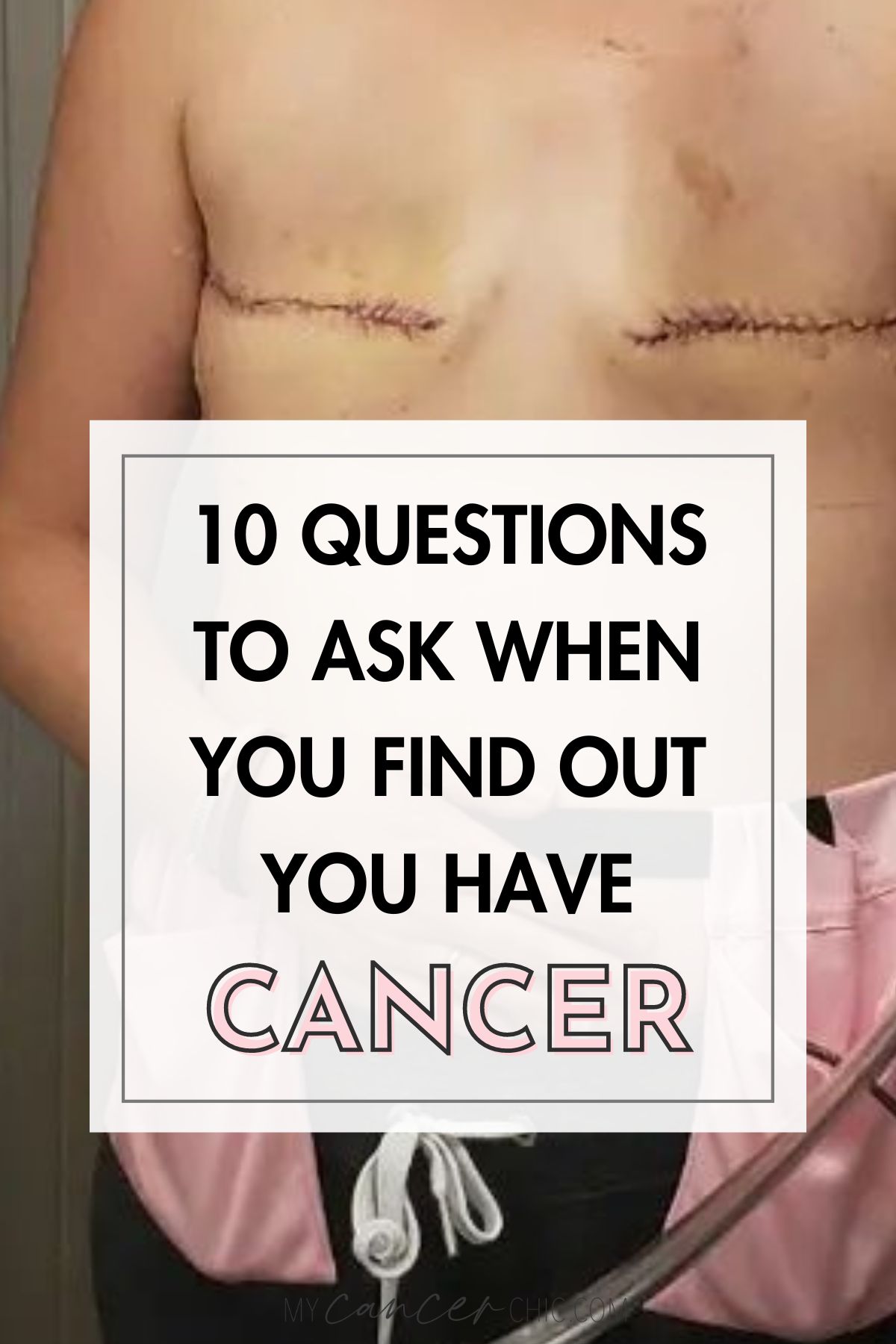
My Diagnosis Journey
Two days later, the surgeon who had biopsied my right breast told me my tumor was malignant and I had Invasive Ductal Carcinoma. In that moment I became a cancer patient and was too overwhelmed to know the important questions to ask. I had to wait five days before I was introduced to Dr. Dull, who would become my breast cancer surgeon. She would go on to explain tons of medical information to me, including that my tumor was 3.6cm and that it was 2% ER+, PR-, and HER2-. I wish I had a family member or friend with me to help me later process all of that information.
Later, at the cancer center, in a small room, she explained my possible treatment options and offered genetic testing, which I chose to pursue. After a lymph node biopsy, I learned my cancer was localized to the breast - the day before my 35th birthday. This information would inform my treatment plan.
As with my story and many of yours, too many things are said to you during your initial meeting with your cancer care team to process with understanding. To better process the news and information you receive, it can be helpful to bring a family member or friend to the appointments. Have them record or take detailed notes that you can review later as the information becomes relevant or needed. Below you'll find my list of questions I recommend for those newly diagnoses or preparing for a potential diagnosis.
I am now a three-year Triple Negative Breast Cancer survivor, and here are the 10 questions I wish I had known to ask my doctor when I was diagnosed with cancer.
What is my cancer type & prognosis?
Understanding your type of cancer is extremely important. While many people think there is one kind of treatment, there are many subsets of cancer that will determine your treatment plan. Once you know this information, ask your doctor, "What treatment do you recommend?". You can also follow up by discussing how treatment may affect your daily activities. Knowing your prognosis and cancer details can be empowering and help you weigh the risks and rewards of different options. As you process the details of your prognosis, some of these breast cancer quotes may bring you inspiration.
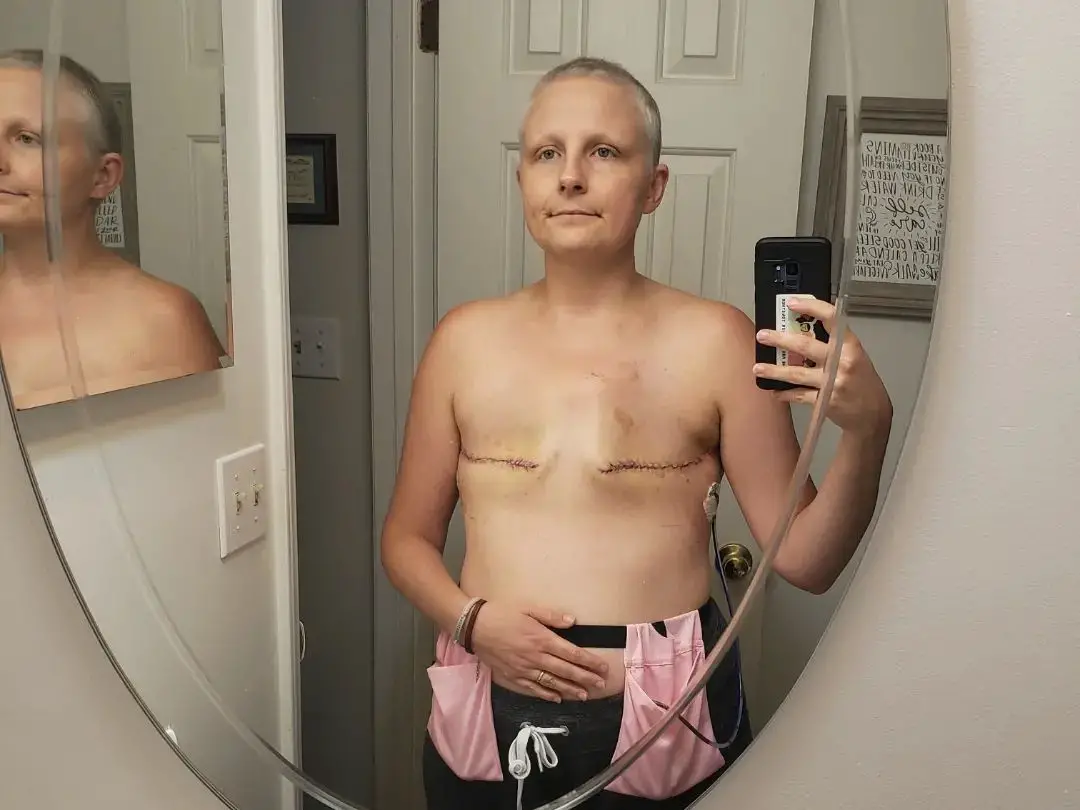
Are there any clinical trials available to me, and how much time do we have to find out if I qualify?
Many times people are unaware that participation in a clinical trial is an option. I was offered a phase 3 clinical trial on immunotherapy. My team sent my biopsy sample out to be checked by the clinical trial team to determine whether I qualified, but adverse weather delayed its arrival, so my team and I decided I didn’t have time to wait; I needed to get started on chemotherapy. If clinical trials make you uncomfortable, which is understandable for various reasons, I recommend the organization TOUCH for Black breast cancer and its highly educational material on clinical trials called When We Tri(al). You can also search for clinical trials you may qualify for here.
What options do I have for fertility preservation?
You have fertility options, but sometimes you don’t have a lot of time to consider them or understand what complexities might arise after treatment. Ask your care team about financial assistance for fertility preservation and advocate for time to decide if this is important to you. Learn more about Anna's cancer fertility journey here.
What scans does your care team recommend?
As part of your cancer treatment, different scans will be done. Maybe a CT scan or a PET scan? Many of the cancer friends I started to make after being diagnosed mentioned being offered CT and PET scans, and I always wondered why I was not provided them. The scans you get will be unique to your cancer and situation. This is a great question to ask your care team in the first few appointments. Particularly if you have a multidisciplinary team, they will work together to determine the best scan approach for you.

What support groups do they recommend?
Cancer can be isolating. I needed to meet people my age, and hoped to meet some other moms going through cancer with kids. I ended up getting involved with Elephants and Tea magazine online, which offers events and programs. There are also many in-person support groups through YSC (search by your state). Check out Anna's resource page for more organizations that support survivors. Ask your hospital if they can connect you with support groups virtually or in person.
Will surgery be your first line of treatment?
The timing of treatment options will be unique for each person. Many times patients are not given this information and it can lead to confusion. Start by asking this question right away as well as how long you have to decide. You will want to explore what surgeries you qualify for (double mastectomy, direct to implant, expanders, prepectoral, under the muscle). Once you know what type of surgery you plan to get you can ask other questions about nipple sparing, aereola sparing, placements of scars and more.
I recommend getting a plastic surgeon on your case at the beginning to explore all your options - even if you may decided to get an aesthetic flat closure. Ask them to see photos of their work and interview them like you would choosing someone for a job. Remember, even though this decision is rushed if you’re having surgery first, it is your decision, and there are so many who have gone before you that you can ask for practical advice. I liked going to breastcancer.org community forums and searching topics to engage with survivors who have made these decisions before you.
What will determine if you will need further treatment or chemotherapy before surgery?
For many people, chemotherapy will be the first line of treatment before surgery. But if your care team is recommending surgery first, your pathology report from surgery will lead to an Oncotype score, which can inform the next steps. Oncotype scores are not used for patients with HER2+ breast cancer. Certain oncotypes will indicate the need for chemotherapy after carefully measuring your tissue to determine how likely your cancer would be to spread - this is called your risk of recurrence. Tumor Grading and Staging may also be used to determine a treatment plan.
Ask for a copy of your tumor details.
Knowing your tumor details can be helpful immediately and years down the line as new research emerges. This information can give you peace of mind as studies offer encouraging information on the recurrence rate for specific types of tumors. I highly recommend getting a second and potentially a third opinion on all decisions and having your details and scans with you will help make that process seamless.
You may ask for tumor information such as subset, Ki67 score, Oncotype, Mammaprint, TILs, and PDL1 status.
Ask for a full panel of genetic testing.
Knowing whether you have specific genes will help inform your treatment plan. Better understanding your genetic risk can also help you make health decisions in the future. Some breast cancer mutations are linked to melanoma risk, which would also lead to more informed precautions.
What could the side effects of chemotherapy look like for you and how will your team manage them?
Remember, everyone responds differently to each chemotherapy drug, but it is important to know what could happen and what to do if it does. Knowing all the potential side effects ahead of time can make you feel more empowered. Check out Anna's full chemotherapy guide for more tips.
You may come up with many other questions as you go along with treatment, so make sure you know who the point person is to field those questions for you. Many cancer centers have patient navigators who will give you their direct line so you can reach out to them as questions arise. You also have access to your care team through your hospital’s patient portal, which I found that while I was undergoing treatment, my care team was very responsive to the questions that arose.
Mainly, know that you have the right to ask anything, get a clear answer, have a second to think about huge decisions, and get a second opinion or transfer care if needed. You stay you even after a cancer diagnosis, and making sure you are getting what you need is self-care. I hope you lean on your support system, reach out to survivors who went through this before you, and, most importantly, know you are not alone.
Follow Erin's breast cancer, her writing, advocacy work, and survivorship on her social media page.

